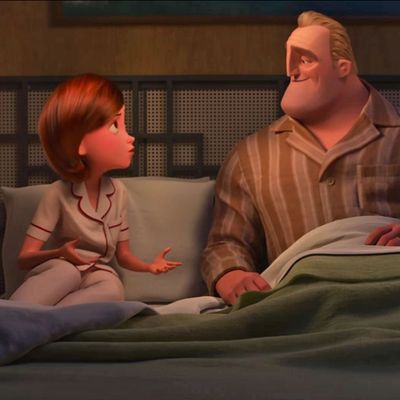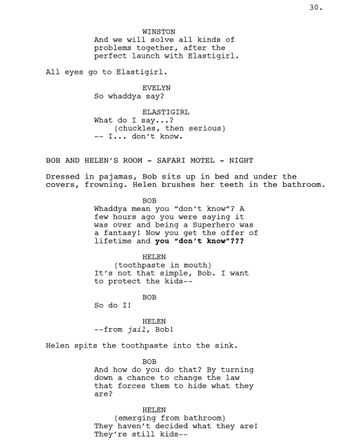
Once again, Vulture is speaking to the screenwriters behind the awards season’s most acclaimed movies about the scenes they found most difficult to crack. For this installment, Incredibles 2 writer and director Brad Bird discusses the scene that sets up the family’s conflict throughout the film: Elastigirl (Holly Hunter) has been asked to be a superhero again, and she and her husband, Mr. Incredible (Craig T. Nelson), are deciding if she should take the job, and what it would mean for their family. Mr. Incredible is also licking his wounds, hurt that he wasn’t the one chosen for the job.
The first Incredibles film was about how we’re wrong about our lives, how we can never really tell what the core elements of our being are, how we don’t understand ourselves as well as we think we do. Incredibles 2 is about switching those roles: If a big assignment didn’t go to Mr. Incredible but went to Elastigirl instead, what would that do to this family?
On the films that I’ve done, there always ends up being an important scene right at the end of act one that launches the body of the movie. Here, it’s the scene where Bob and Helen are talking about Helen being offered the opportunity to bring supers back into the spotlight. It occurs at that place in the movie where you’re really stating a lot of what the movie is and who the characters are. It seems like I rewrote this scene a thousand times. I wanted to show the conflict within Bob and show how difficult it was for him to admit that Helen was maybe better for this job. For her, I wanted to show that Helen had no doubts about her own abilities. The job was intriguing to her, but being a superhero wasn’t in the key position for her that it was for Bob. When they first got married, they were both all about their careers, and then they had to shift. Helen has made the shift better than Bob has, and in this scene we get the sense that she’s a more developed person, at this point, than he is.
I wanted it to be a mixture of childishness on Bob’s part, him being pouty that somehow he’s been waiting at the sidelines to get back into the game, and then they don’t pick him. They pick the girl who really hasn’t been pining about it the way he has. That seems wrong to him. He wants it more, he thinks, so therefore he should get it. It was so easy to have Bob become too childish — and if he’s too pouty, you’re going, Why would Helen stay married to this guy? Bob wants to be a supportive husband, but he doesn’t want it to be at the expense of what he thinks is his rightful place in the world. He has to cope with that, and cope with his own limitations.
When this movie opens, the family doesn’t have a house. The government protection program is being shut down, so they don’t have anyone even providing them with a hotel any longer. Their options are dwindling right before our eyes.
Visually, I also wanted to be able to contrast their motel room with what we see when they meet with Winston Deavor about the job. There’s such splendor there: They are in this spectacular room. It’s above the clouds, at the very top of the skyscraper. It’s sort of magical there. The motel room feels incredibly grounded and small and cramped and a little dim.
The first versions of this scene had Bob being uncomfortable with a pillow. Helen is trying to sleep, but he keeps flipping the pillow over, and getting aggravated with the fact that he can’t get comfortable with it. He tries to fluff the pillow so hard that he rips it apart and all the feathers go all over the room. Then Helen says, “Should we talk about this?” I always liked that, but it became big too early. It made him too pouty too early. I had to find a way to kind of walk him between being a child and being a grown-up.
Helen is looking at this, thinking more about where they are in their lives, like, “When we were doing [the superhero job], we didn’t have kids. Now we have kids.” We’re getting to a larger theme of the movie here, too. Being a super is not Helen’s identity completely. Bob sees himself as a superhero who has kids, whereas Helen sees herself as a mother and a wife, a parent of kids, who happens to be good at fighting supervillains.
The way I tried to think of it is like if you are a cop and you have kids, and the kids start thinking about what they want to do when they get out to the working world. If they also want to be a cop, you know exactly how dangerous it is. You know that it can be life-threatening. Do you want your kids to follow in your footsteps that way?
When you’re single you can be sort of unthinking because you’re only worrying about your own life, and you can brush it off in some ways. But when you have kids, they’re almost like little parts of your own body going out into the world with a mind of their own. You have this vulnerability that you didn’t have as a single person because now your state of mind is all wrapped up in their health as well, and they can make independent decisions.
The audience got a reveal at the very end of the first film that Jack-Jack has a multiplicity of powers. One of the conceits in The Incredibles is that I didn’t pick the super powers just as super powers. I picked them to comment on people’s roles within the family: Babies are unknowns, and one of the things I knew if I made another Incredibles film was that the family doesn’t know that he has multiple powers, but the audience does. It’s only a matter of time before they’re going to find out.
In many versions of this scene, I made Bob too pouty, then I cleaned that up. But then Bob was so “good” that, to me, it wasn’t interesting: Yes, he was a good person. Yes, he was more grown up than he was in previous versions, but then I didn’t see any conflict in him. He was just a good guy, and that’s not interesting either. What you want to show is that he’s a flawed guy and that he’s trying to be a better guy. It came down to this one line. This line cracked it for me, and it’s not a spectacular line or anything. It just enabled me to show the conflict in him, and not let the scene get derailed.
This line is him admitting it: Bob is still stung by the fact that all of the pie charts and all of the stats on the supers show that she was a more efficient superhero than he was. Even though their conversation has moved far away from it at that point — what they’re talking about has nothing to do with who would be a better superhero for the job — he is still smarting over that.
That “too” — that was the way back into the pouty stuff.
Bob has trouble saying those lines, and he has to laugh because Helen has very gently pointed out what his limitations are, and he has to admit, yeah, he’s being childish. When I got that back in, I felt like I got the scene: He’s a good guy, he’s trying to be better, but he’s still got some big character flaws that will, hopefully, largely be ironed out in the next two acts.
The weird thing about the scene is that ultimately Bob wants her to get out there, too, because that’s the only way he’s going to get the laws fixed to the point where he can be a superhero again. He needs her to succeed. On a very selfish level he needs her to do well. But the competitive side of him, who’s really still kind of a boy in some ways, wants to go back into the game himself. This scene was a chance to show all those conflicts, both sides of both people. The family side and the work side. Everyone’s priorities have to be flipped.
Animation is about creating the illusion of life, and this is life. Most people would say an animation scene is some fantastic piece of magic or a talking animal, that it’s not two adults sitting in a hotel room talking about their lives. This is really two characters having a genuine discussion that’s not an argument. It is, to me, exactly one of the reasons I love good character animation, a kind of scene that I would’ve loved to have had when I was animating. I kept returning to it, using new lines, rerecording old lines, because it’s just a scene where you really get to know who these people are.
Below read the scripted version of the scene:
Now see how the scene plays out in the finished film:

















